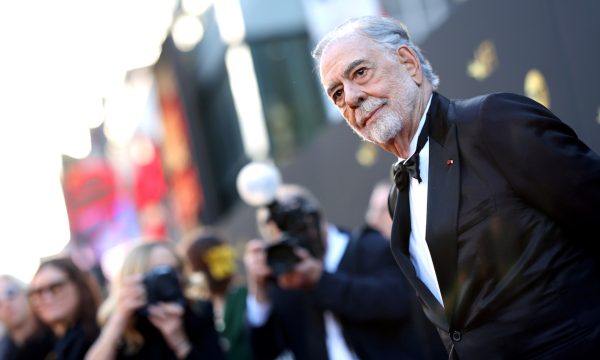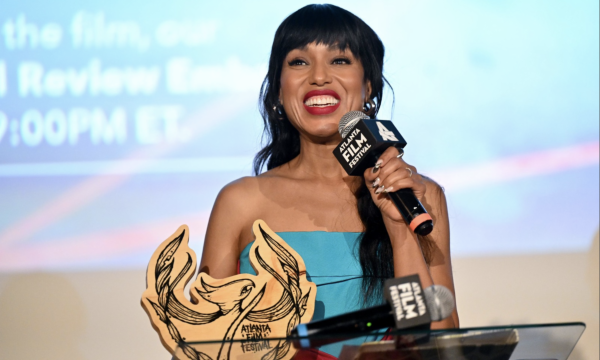
A lovable grump sets out to meet the daughter he never knew he had in “Wilson,” an acidly funny dark comedy starring Woody Harrelson, Laura Dern, Judy Greer and relative newcomer Isabella Amara (“The Boss”).
Adapted by Daniel Clowes (“Ghost World,” “Art School Confidential”) from his graphic novel, and directed by “The Skeleton Twins” director Craig Johnson, this likable if lightweight spring release ekes by on the simplicity of its direction, the specificity of its writer’s voice, and the strength of its knockout lead performance by Woody Harrelson. With a straightforward narrative about a lovable loser on a mission of self-discovery, “Wilson” puts the emphasis on laughs, most of which are earned by Harrelson’s brutally honest title character, but also packs some unexpected emotional depth as the story progresses. A pristinely produced, tonally assured comedy accompanied by a lively score by Jon Brion (“Punch Drunk Love”) and inviting cinematography by Frederick Elmes (“Patterson,” “Blue Velvet”), “Wilson” is a crude charmer that, much like its title character, will wear you down until you can’t help but like it.
In “Wilson,” Harrelson plays the title character, a nerdy curmudgeon who lives with his dog Pepper in a dingy apartment. Aside from Pepper, his dog sitter, Shelly (Judy Greer), and the friendly neighborhood couple (Brett Gelman and Mary Lynn Rajskub), Wilson leads a lonely existence, and resorts to stopping strangers on the street in order to deliver unwanted diatribes about society’s ills (technology, gentrification, suburban sprawl).
Although Wilson is perfectly content with his less than ideal lifestyle, his world is thrown into disarray when he learns his father has terminal cancer, bringing about a previously unexplored self-reflective side. Inspired to mend his relationship with his estranged ex-wife, Pippy (Laura Dern), a recently returned recovering addict with a seedy sexual history, Wilson tracks her down at a local restaurant much to her dismay.

After a night of booze-inspired carnal reconciliation, Wilson discovers that Pippy never went through with the abortion she claimed to have had years ago, and actually had a baby girl and put her up for adoption. Ecstatic over his newfound paternity, Wilson sets out to meet the daughter (Isabella Amara) he never knew he had, and brings Pippy along as his begrudging companion. As one might expect, problems of both the spiritual and legal nature soon arise as a result of this unconventional familial bonding.
Throughout his career as a cartoonist, graphic novelist and screenwriter, Daniel Clowes has specialized in celebrating society’s outcasts and misfits, and while his collaborations with director Terry Zwigoff (“Ghost World,” “Art School Confidential”) have arguably yielded more potent results, “Wilson” still sports his signature cynicism to hilarious effect. Although some characters are undeniably better developed than others, and even Wilson himself is perhaps too cartoonish to reside in realism, Craig Johnson’s astute direction finds the heart in the absurdist proceedings, grounding the story just enough to allow audiences to overlook some of its more dubious detours. Much like its contradictory central character, Frederick Elmes’ camerawork manages to be both vibrant and subdued, evoking the protagonist’s nostalgia for the “good old days” as well as his relentless optimism. Jon Brion’s whimsical score also keeps things light but also hits a few melancholic notes that the story necessitates.

Casting is crucial here, as the title character treads such a fine line between endearing and distasteful, and it’s hard to think of a more suitable choice for the role than Woody Harrelson, whose decades-spanning career has covered everything from hysterical sports swindlers (“Kingpin,” “White Men Can’t Jump”) and menacing meth heads (“Out of the Furnace”) to morally murky cops (“True Detective,” “Rampart”). Only someone with Harrelson’s likability factor could pull off the high-wire act that is Wilson, and he does so with ease. Less memorable are the supporting roles, though veteran actors like Laura Dern and Judy Greer make the most of their idiosyncratic characters. Cheryl Hines (“Curb Your Enthusiasm”) also excels as Pippy’s disapproving sister, but it’s Isabella Amara who really stands out among the supporting players, inhabiting her adopted daughter character with a winning blend of humor and pathos.
Though certainly not for everyone, “Wilson” is ultimately a winning character study about a lovable loser. Give him the attention he so desperately desires.
Running Time: 94 minutes
Rated R for language throughout and some sexuality.














